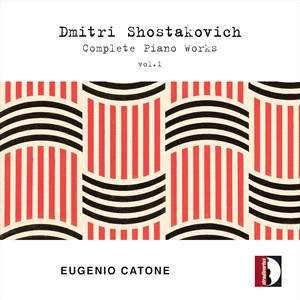
ESSENTIAL RECORDINGS

Aphorisms, Op. 13 8 Preludes, Op. 2 3 Fantastic Dances, Op. 5 Funeral March in Memory of the Victims of the Revolution (1918) Nostalgia (1918) Piano Piece in C Major (1919) Prelude-March (1919) In the Forest (1919) Bagattelle (1919) 3 Piano Pieces 24 Preludes, Op. 34
When you think about it, it's rather deplorable that an iconic composer as illustrious as Dmitri Shostakovich (1906-1975), who wrote 15 of the most impressive and influential symphonies, as well as 15 of the most superlative string quartets of the 20th century has not, even after almost 50 years after his death, seen recordings of all his music come to completion. At least where his music for solo piano is concerned, Italian pianist Eugenio Catone plans to rectify this glaring omission with the release of recordings covering each and every note. The booklet notes explain that these performances are based on the revised urtext edition of his works (DSCH, New Collected Works, Series XII, 2007-2018), which includes numerous pieces that had never been published until now.
For example, in the previous 1966 edition, the Preludes, Op. 2 only included five of the eight pieces presented in this recording. These short pieces, from a budding composer still in his teens who hadn't yet found his voice, emulate the early Preludes of Chopin and Scriabin more than anything else. The same could be said of the Funeral March in Memory of the Victims of the Revolution which is highly redolent of Chopin's own Funeral March. The Piano Piece in C Major from 1919, brings to mind the piano music of Franz Schubert, and the In the Forest from the same year resembles the idyllic musings of a young Franz Liszt. It's obvious that during those early years, Shostakovich was honing his skills based on the familiar music he himself had learned and played while growing up. Only once you get to the 24 Preludes, Op. 34 from 1933, written shortly before his iconoclastic Fourth Symphony, does his unique harmonic language and sardonic style emerge. Nowhere is that more apparent than in the No. 7 in A major heard in the audio clip below.
Eugenio Catone has already been presenting Shostakovich's oeuvre for the piano as part of many recitals and masterclasses in various countries. I for one can't wait to see what he has to offer within the enigmatic 24 Preludes and Fugues, Op. 87.
Jean-Yves Duperron - February 2022